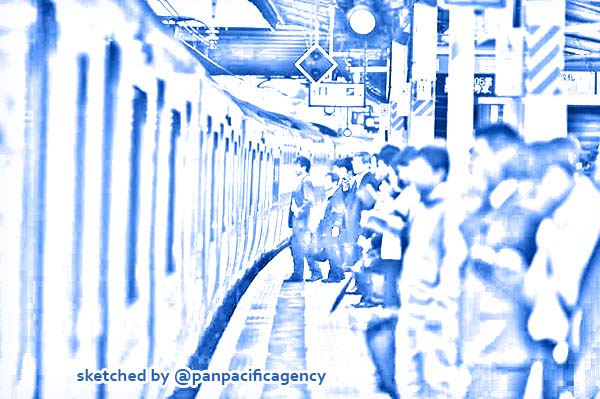Even before coronavirus, Japan economy likely took biggest hit since 2014

Morning commuters prepare to board a train in Yokohama, Japan, on Monday, May 14, 2018. Japan is scheduled to release its first-quarter gross domestic product (GDP) figures on May 16. Photographer: Takaaki Iwabu/Bloomberg. Sketched by the Pan Pacific Agency.
TOKYO, Feb 15, 2020, Bloomberg. The economy likely suffered its biggest contraction since 2014 at the end of last year, leaving it in a vulnerable state as fallout from China’s viral outbreak threatens to turn a one-quarter slump into a recession, The Japan Times reported.
A sharp drop in consumer spending after a sales tax hike is seen as the main culprit behind an annualized 3.8 percent contraction estimated by economists. The slide would be the worst for Japan since the second quarter of 2014, when a previous tax increase prompted the economy to shrink by 7.4 percent.
Economists previously viewed the expected fourth-quarter contraction as a tax-triggered blip compounded by typhoons that battered manufacturers struggling with weak export demand. But economists are now concerned the new coronavirus could delay or even derail a weak recovery forecast for early this year, an outcome that policymakers would find difficult to ignore.
“Japan’s underlying economy isn’t on a firm footing to start with, so growth can be easily pushed into a negative territory if something like the coronavirus happens,” said Hiroshi Miyazaki, an economist at Mitsubishi UFJ Morgan Securities. He takes a far more pessimistic view than the consensus, forecasting a 7.5 percent decline.
Even before the virus started to threaten the outlook, the economy was looking shakier than government officials and economists had expected.
Analysts’ forecasts have become progressively gloomier as it has become clearer that shopping rebates and other government measures meant to maintain households’ spending after the tax hike haven’t worked as well as hoped.
Economists estimate that consumer expenditures fell 7.8 percent in the fourth quarter, alongside declines in business investment and exports.
The full extent of the economy’s weakness may also be masked if higher inventories give the headline growth figure a temporary boost. That’s because higher stockpiles now will be a drag on growth later when they’re sold down.
While most economists still project the economy to eke out growth this quarter and avoid a recession, they are again revising down their projections amid concern the impact of the virus in China will hit exports and also reduce tourists to Japan from the Chinese mainland.
Prime Minister Shinzo Abe already took action in December to support the economy with a stimulus package that should lift growth as the year progresses. The prime minister also announced Thursday a limited raft of measures to help combat the impact from the viral outbreak, including loan guarantees for small businesses. He’ll likely want to see more evidence of economic damage before taking more extensive action.
The Bank of Japan is likely to hold off on using any more of its depleted policy ammunition to prop up growth, arguing that the special factors weighing on the economy are transitory.
The BOJ is still forecasting the economy will stay on track for a mild recovery, although downside risks from the new coronavirus require close watching, Executive Director Eiji Maeda told the Diet on Friday.